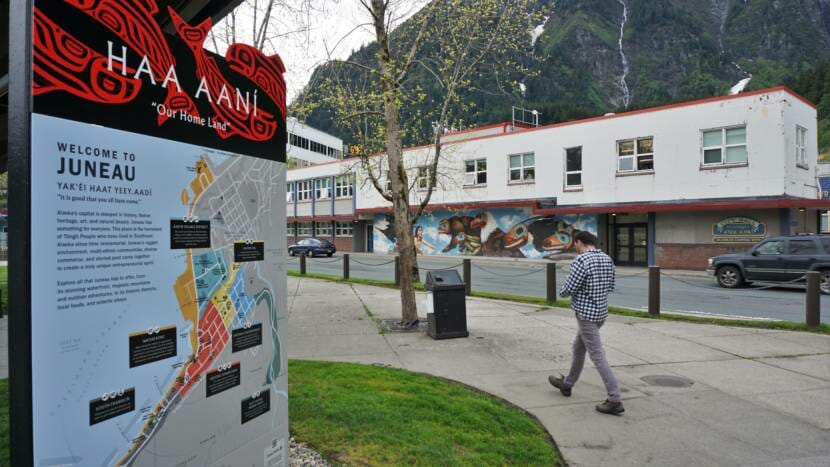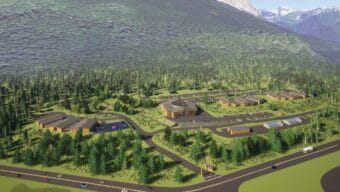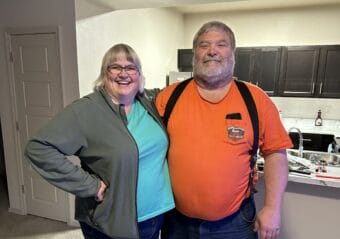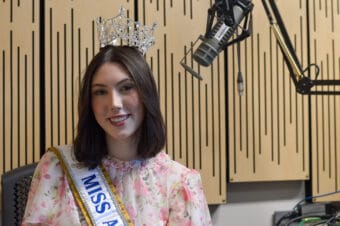
The Juneau Assembly got together in-person, mostly, for its regular meeting last week for the first time in over a year. One member was still participating through Zoom — but not because of the pandemic. She was out-of-town on city business.
During the meeting, the Assembly adopted new rules that institutionalized how that member was participating, among other pandemic meeting practices. Now Assembly members and the public can keep watching and participating in meetings remotely after the pandemic is over.
The new rules also include Indigenous land acknowledgments.
At the beginning of some Juneau Assembly meetings, right after the Pledge of Allegiance, you may have heard something like what Assembly member Christine Woll read on May 24:
“We want to take this opportunity to acknowledge the City and Borough of Juneau is on Tlingit land. And to honor the A’akw Kwáan and T’aaḵu Kwáan, the Indigenous people of this land. For more than 10,000 years, Alaska Native people have been and continue to be integral to the well-being of our community. We are grateful to be part of this community, and to honor the culture, tradition and resilience of the Tlingit people. Gunalchéesh.”
Assembly members started making land acknowledgments at their regular meetings a few months ago, about the same time they were participating in dialogues on racial equity with the First Alaskans Institute.
The Assembly’s land acknowledgments haven’t been consistent, but now that it’s in the rules of procedure, they are supposed to be.
Rhonda Butler is the Camp 2 president of the cultural and civic group Alaska Native Sisterhood in Juneau. She’s of Haida descent, Raven Double Fin Killer Whale of the Yak Laanas clan, and the grandchild of a Tlingit L’uknax.ádi Raven Coho.
“It makes me feel good inside that recognition is being given appropriately and respectfully to the people that resided here prior to Western civilization coming in and changing things for us,” Butler said. “So that’s very nice, a very nice respectful touch from the city of Juneau.”
Butler said land acknowledgments are becoming more common in the community, which she sees as a sign of better awareness of Alaska Native cultures.
The package of rule changes were originally about updating options to access city meetings. In committee last month, Assembly member Alicia Hughes-Skandijs asked for the land acknowledgment piece to be added.
The committee voted yes, 6-3. Assembly members Loren Jones, Michelle Hale and Mayor Beth Weldon voted no.
Weldon and Hale said they wanted to spend more time fine-tuning the wording, among other things.
Jones didn’t have much to say before his vote.
“I will be voting no. I don’t think we need to do the land acknowledgments,” he said.
Reached later, he declined to discuss his vote. He said it was too controversial.
The Assembly later passed the entire package of rule changes unanimously.
The other changes improve meeting access for members participating and the public, even after in-person meetings resume.
“After going through all our meetings on Zoom, we realized that Zoom was probably going to be a component of our meetings from here on out,” Mayor Weldon said.
References in the old rules to allow for limited telephone participation have been swapped out for remote participation.
“It allows our members who are not present a better way for them to come in, rather than the teleconference, which was very difficult to call in and be an active part of the meeting. And it also allows some of our public another option to testify,” she said.
Also, Assembly meetings now generally must be broadcast live. That applies to full Assembly meetings, Assembly committees and some other local, public bodies, like the Planning Commission and Eaglecrest Ski Area Board.
As the pandemic escalated last year, the Assembly temporarily suspended requirements for meeting in person and began webcasting video of meetings over Zoom and sometimes Facebook Live.
Weldon highlighted one more benefit that comes with broadcasting the meetings: closed captioning.
City Clerk Beth McEwen said before the pandemic, she would sometimes hire sign language interpreters to work meetings live, when requested. But that didn’t work very well over Zoom. So now McEwen hires captioners to accommodate people with hearing impairments.



